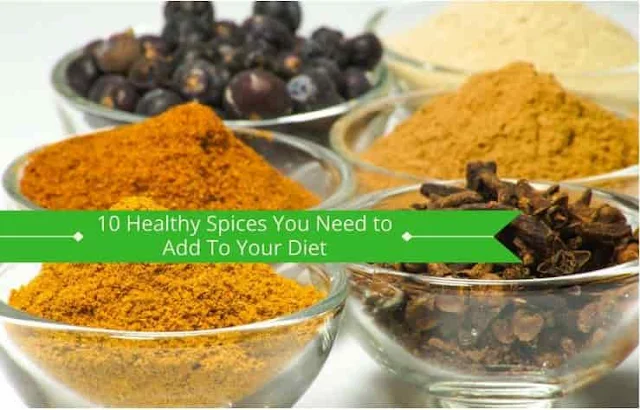Many are concerned about the lack of basic equipment and food, which are often used for expensive purchases but are often ineffective in paying back. This approach reflects anxiety about eating enough and leads them to find more solutions, despite their many successes and confidence.
 |
Some spices are rich in essential nutrients that support our health by increasing circulation and promoting good digestion.
According to WebMD, many spices and herbs offer fantastic health benefits.
Spices not only improve the taste of food, but also add health benefits to other foods that contain sugar and salt. It can be difficult to switch from very good products that make our spaces happy and taste like flowers to natural foods because desserts tend to be more subtle and delicate.
Carefully choosing the perfect spices can increase the effectiveness of foods, thus contributing to our health.
What Are the Ten Best Spices to Eat?
Chili And Peppers
From cayenne to chili, peppers are an incredible way to boost your health and your weight loss journey. The active portion of the plant, capsaicin, is the portion that produces the nourishment feel hot.
It is additionally the portion of the plant that works to boost digestive processes rather too well, sometimes! Dr. Stephen Sinatra suggests eating cayenne digestive relief and also advocates topical applications to relieve the symptoms of arthritis pain and muscle aches.
Chilies will increase your body’s fat burns as well as including a few awesome flavors to flat solid nourishment.
Ginger
Ginger has long been known to boost energy and overall health. It also calms upset stomachs and alleviates some arthritic pain.
Add this versatile root to both savory and sweet dishes, or infuse it with lemon and honey for a warming drink. This energizing beverage will kick-start your day and improve your digestion.
Cinnamon
Cinnamon enhances a variety of recipes, such as smoothies, soups, and juices. Its sweet, spicy aroma adds a delightful fragrance to dishes. However, the raw spice is quite pungent and can cause a burning sensation if eaten alone.
It is excellent in desserts, but it also enhances savory stews and curries. Consuming cinnamon helps lower and stabilize blood sugar levels. This is especially beneficial in a world with rising diabetes rates.
Turmeric
Turmeric, a bright yellow powdered spice, resembles ginger root but has a vibrant yellow color inside. Currently, it is experiencing a surge in popularity.
This trend is worth following because turmeric's numerous health benefits are well-documented and significant.
It offers several benefits, including enhanced mental acuity in old age and improved heart health. Some studies also suggest it may help prevent certain cancers.
Add turmeric into scrambled eggs, rice, soups, and vegetables. Turmeric smoothies are an excellent way to add this super spice to your diet. If you're in need of a blender, you can find a guide to buying the best blender here.
Saffron
Long valued for its vibrant color, saffron is now recognized for its internal health benefits. It has anti-depressant properties and provides numerous essential trace elements often missing from modern diets.
Saffron is a fantastic addition to rice dishes, risotto, bread, jams, and paella. Its unique flavour and colour enhance these dishes beautifully.
Parsley
Parsley is a widely used herb known for its versatility. It enhances a variety of recipes and is an excellent source of vitamins C and K. Additionally, it's rich in folate, making it an ideal choice for pregnant women.
If you're seeking a spice to help relieve joint pain, support bone health, and lower the risk of diabetes, parsley is worth incorporating into every meal.
Sage
Sage is one of nature’s remarkable remedies. Its aromatic, fuzzy leaves complement savoury dishes, but its benefits go far beyond flavour.
Sage is highly effective in treating digestive and gastric issues, alleviating painful digestive transit, and soothing inflamed stomachs.
Rosemary
Rosemary imparts a distinctive flavour to lamb and mutton, but it also offers several health benefits. It possesses anti-fungal, anti-septic, anti-bacterial, and anti-inflammatory properties, all of which contribute to overall health and a strong sense of well-being.
Rosemary Can Also be Used Topically
To make rosemary tea, steep the leaves in boiling water and let them infuse overnight. Strain out the leaves and any twigs, then save the slightly murky liquid.
Apply this rosemary-infused water to acne-prone skin twice daily for about a week. By then, you should notice visible improvement.
Note: Store the rosemary-infused water in a cool place, but avoid keeping it next to milk, as it may cause the milk to sour prematurely.
Cumin
Cumin has a distinctive, earthy aroma—pleasant but unusual. It will be familiar to those who enjoy curries made from scratch rather than pre-made sauces.
Beyond adding a wonderful kick to your dishes, cumin offers several health benefits. It's beneficial for breastfeeding mothers and can aid in treating skin issues like boils. Additionally, cumin has been shown to be effective against respiratory conditions such as asthma, iron deficiencies like anaemia, and can even help with insomnia.
Basil
Basil enhances tomato-based dishes and is also known for its anti-microbial properties, which help fend off viruses and infections. It's especially useful when you're surrounded by coughing and sneezing colleagues or classmates.
Additionally, basil has been found to fight cancer, reduce stress, and support cardiovascular health.
Wrapping It Up
Given the numerous health benefits that spices offer, can you really afford to leave them out of your diet? We’ve highlighted the best spices to use in your meals; now it’s up to you to start using them.
The ways to add spices to your diet are virtually limitless. The best part is that they make healthy eating both enjoyable and flavorful!
0 comments:
Post a Comment